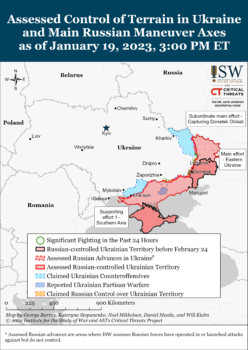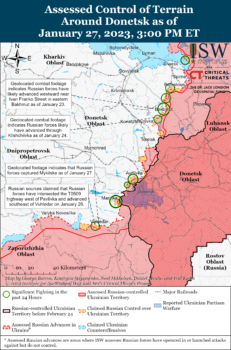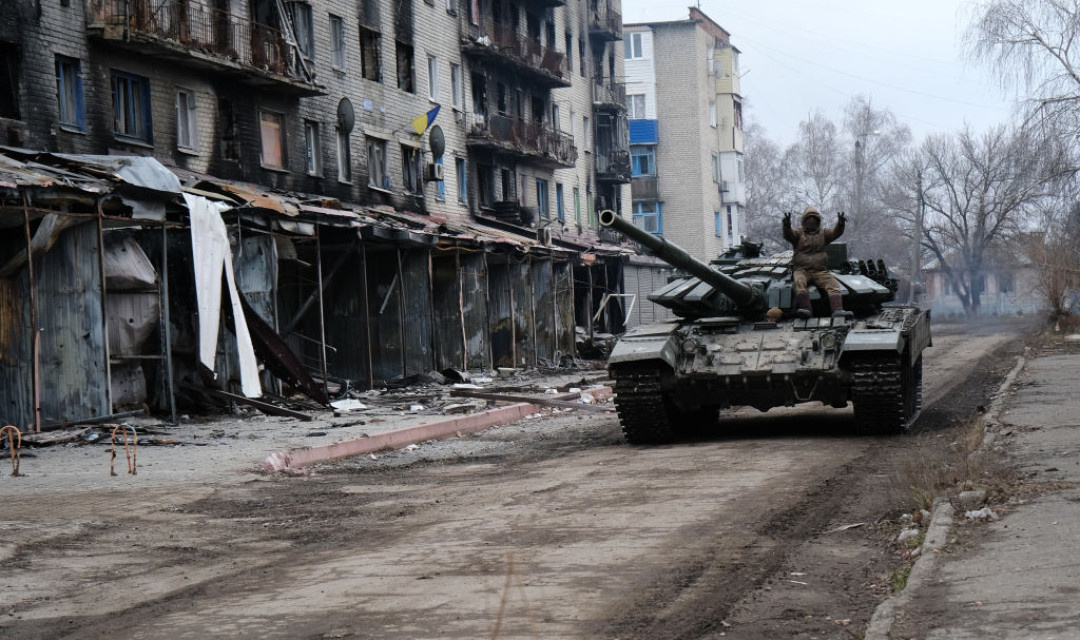A Ukrainian tank in the heavily damaged town of Siversk in Donetsk region in eastern Ukraine, January 21, 2023 (Spencer Platt/Getty)
Friday’s Coverage: Another Failed Russian Missile Barrage

Source: Institute for the Study of War
UPDATE 1454 GMT:
Commentators on Russian State TV decide that out of countries under long-term sanctions — Cuba, North Korea, and Iran — Moscow should follow the path of the Islamic Republic.
None of the pundits mentioned that Iran is in economic crisis, with a plummeting currency, rising inflation, and nationwide protests.
An important discussion took place on state TV today:
Which country's economy is the best model for Russia to follow? Cuba, North Korea or Iran? pic.twitter.com/tShi724tGM
— Francis Scarr (@francis_scarr) January 27, 2023
UPDATE 1212 GMT:
The Israeli Ambassador to Germany, Ron Prosor, has indicated that Israel is secretly providing assistance to Ukraine.
Prosor said Israel had been cautious because of its relationship with Russia in Syria, implying that Moscow is allowing Israeli attacks on Iranian and Assad regime targets which “regularly block arms shipments from Iran to Syria and Lebanon”. The Ambassador also noted “a large Jewish community in Russia”.
However, he said, “We help — albeit behind the scenes and much more than is known.”
UPDATE 1200 GMT:
A Ukrainian mother speaks about the reunion with her daughter, who had been seized and taken to Russia.
The case is an exception — Ukraine’s Presidential advisor for children’s rights, Daria Herasymchuk, said last week that officials had confirmed the deportation of 13,899 children to Russia but only 125 had been returned.
The UN High Commissioner for Refugees, Filippo Grandi, said on Thursday that Russia is violating the “fundamental principles of child protection” in wartime as it puts Ukrainian children up for adoption and gives them Russian passports.
"I reported to the police that my child had been illegally taken to Russia." After nearly a year-long ordeal and separation, volunteers helped reunite a Ukrainian mother and daughter in Kyiv. By @rferl's @radiosvoboda pic.twitter.com/DmgndREXoa
— Euromaidan Press (@EuromaidanPress) January 28, 2023
UPDATE 1148 GMT:
On Russian State TV, prominent polemicist Vladimir Solovyov rails that deliveries of German-made Leopard 2 battle tanks to Ukraine will be the “rehabilitation of Nazism”.
Margarita Simonyan, the editor-in-chief of State outlet RT, says “94%” of Germans are against the deliveries: “We need to liberate these German people from these fascists.”
🤡 While Solovyov talks about "rehabilitating Nazism" in #Germany and declaring a "holy war", propagandist Simonyan already wants to "liberate" Germans from the "fascist" government in 3 days. pic.twitter.com/6QMd3vRxYC
— NEXTA (@nexta_tv) January 27, 2023
UPDATE 1125 GMT:
Three people have been killed and 14 wounded in a Russian attack on a residential neighbourhood in Kostiantynivka in eastern Ukraine.
Donetsk Governor Pavlo Kyrylenko said four apartment buildings and a hotel are damaged.
In the morning, #Russian troops shelled #Kostyantynivka, Donetsk region. Three civilians were killed. pic.twitter.com/wvtXLjuYQY
— NEXTA (@nexta_tv) January 28, 2023
UPDATE 1115 GMT:
UK military intelligence assesses that casualties from the Ukrainian attack on a Russian barracks on New Year’s Day are far higher than the 89 deaths acknowledged by Russia’s Defense Ministry.
The analysts say it is “highly likely” that there were more than 300 casualties in the converted vocational education building in Makiivka in the Donetsk region in eastern Ukraine.
Most of the casualties are dead or missing, rather than wounded.
Ukrainian officials claimed up to 400 casualties — almost all of the troops believed to be in the barracks.
The UK analysts said the episode highlighted “the pervasive presence of disinformation in Russian public announcements…through a combination of deliberate lying authorised by senior leaders and the communication of inaccurate reports by more junior officials”.
The Defense Ministry finally took the “rare step” of admitting some deaths because “it was not viable to avoid comment in the face of widespread criticism of Russian commanders over the incident”.
UPDATE 0649 GMT:
Russian shelling killed 10 civilians and wounded 20 on Friday, said the Ukraine Presidental office.
Six people were slain in the Donetsk region in the east, two in the Kharkiv region in the northeast, and two in the Kherson region in the south.
ORIGINAL ENTRY: As Russia seeks a breakthrough to counter months of losses and the surge in international military assistance to Kyiv, Ukraine President Volodymyr Zelenskiy has told the nation:
The situation at the front, and in particular in the Donetsk region – near Bakhmut and Vuhledar, remains extremely acute. The occupiers are not just storming our positions – they are deliberately and methodically destroying these towns and villages around them.
Artillery, aviation, missiles. The Russian army has no shortage of means of destruction. And it can be stopped only by force.
Our soldiers, who are defending the areas in Donetsk region, are real heroes.
Both Ukraine and Russia reported “fierce” fighting on Friday for Vuhledar, southwest of Russian-occupied Donetsk city.
Denis Pushilin, the Russian proxy leader of the “Donetsk’s People’s Republic”, declared, “Soon, Vugledar may become a new, very important success for us.”
Ukrainian officials say the village is still contested. Military spokesman Serhii Cherevatyi claimed 109 Russian soldiers were killed and 188 wounded on Thursday: “Fierce fighting is ongoing. The enemy is indeed trying to achieve an intermediate success there, but thanks to the efforts of our defenders, they are unsuccessful.”

A Renewed Russian Offensive in the Spring?
Since last spring Russian forces, Wagner Group mercenaries, and Russian proxy fighters have tried to seize more territory in the Donetsk region after occupying almost all of neighboring Luhansk.
However, in the autumn a Ukrainian counter-offensive liberated all of the Kharkiv region in northeast Ukraine, regained some areas in Donetsk, and established a foothold in Luhansk.
Since then, Russia has redoubled its attacks in Donetsk, with Wagner mercenaries on the frontline and newly-mobilized men thrown into the fight. So far, the effort has only captured the small town of Soledar, north of the city of Bakhmut.
Analysts assess that the Russians do not currently have the capability to surround Bakhmut. However, Ukrainian officials are warning of a second Russian mass mobilization for a spring offensive.
“Russian officials, Kremlin advisors, and other unspecified knowledgeable figures” told Bloomberg that Vladimir Putin is seeking a new offensive.
“He believes that Russia’s tolerance to accept casualities will allow Russia to win the war in the long run despite Russian failures so far,” the sources said.
The Kremlin confirmed on Friday that Putin is issuing pre-emptive pardons for prisoners who go to the frontlines, bolstering the assault in the east.
Spokesperson Dmitry Peskov stated on January 27 said he could not provide additional information because Presidential decrees are protected by “various classifications of secrecy.”
The Russian Human Rights Council’s Eva Merkacheva said in early January that convicts, recruited by Wagner Group leader Yevgeny Prigozhin, are pardoned before their release from penal colonies and transport to Ukraine.

